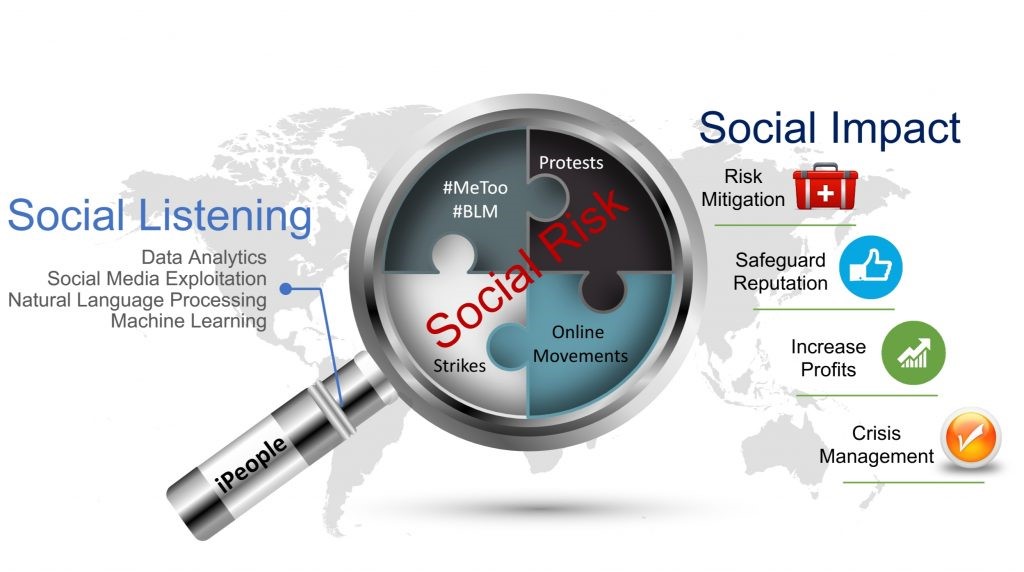Social Risk is the number one source of disruption in our world today and the greatest threat to public and private sector organizations around the globe. It remains, however, largely misunderstood, ill-defined, and unaccounted for in traditional risk analysis – leaving governments and businesses alike highly vulnerable to its negative effects.
Social Risk has increased exponentially in recent years, in both frequency and magnitude. New communications technologies and the rise of social media amplify the grievances and voices of ordinary people and give populations more power vis-à-vis governments and businesses than ever before.
Examples of the disastrous effects of unaddressed Social Risk are everywhere. In the public sphere, Social Risk results in security threats and instability for business and political leaders. It sparked online movements like #BlackLivesMatter, racial tension-fueled riots like those in St. Louis and Charlottesville, and the current anti-government protests now in Venezuela, Slovakia, and Iran.
In the private sector, Social Risk is responsible for similar forms of disruption, as well as scandals, poor organizational management, advertising flops, public relations crises, protests, boycotts, and litigation. Facebook’s one-day $119 billion loss in market value, failed advertising campaigns by Pepsi and Dove, toxic corporate culture like that at Uber and Nike, strikes affecting multi-national corporations in Latin America, public uproar in response to comments like those made by the ex-CEO of Papa John, and events like that at Starbucks last May are all examples.
Government and business leaders are particularly vulnerable to the effects of Social Risk. In the past three years, public backlash has resulted in the forced removal or imprisonment of over 120 individuals – more than in the past fifteen years combined. Since the start of 2018 alone, ten heads of state like Peru’s Kuczynski and South Africa’s Zuma, and dozens of business leaders, from Brazil’s billionaire Eike Batista to Hollywood’s Harvey Weinstein have surrendered to Social Risk.
Social Risk damages the reputations, bottom-lines, stability, and security of governments and companies, causing political and corporate upheaval on a near daily basis. But public and private sector organizations remain ill-prepared and ill-equipped to manage it. They rely on typical risk mitigation techniques and categories (political, market, default, reputational, and technical), and thus fail to effectively understand nor mitigate the different risk factors that emanate from constituents, consumers, and communities.
Private sector companies employ Public Relations (PR) crisis management techniques to contain the damage, while governments use more extreme methods, including the use of security forces, the censoring of communications, and the imprisonment of the opposition. But Social Risk, and the voice of the people more broadly, cannot be ignored or suppressed, and playing PR catch-up can cost more than 10x more compared to proactive mitigation. To save their jobs, their bottom lines, and the stability of their organizations, private and public sector leaders must address population-based grievances, needs, and voices head on.
ENODO Global has designed a strategy that enables companies and governments to identify, manage, and mitigate Social Risk. It bridges the existing divide between technology, data, and human understanding and leverages advanced data analytics, social media exploitation and the power of identity to protect companies and governments from Social Risk across different locations, various industries, and over time.
ENODO employs a scientific, repeatable process, which can be applied in any information, social or linguistic environment. It can also be tailored to specific industries (extractives, marketing, finance, campaigns, governance, development, security, policing, and organizational management) and customized for a clients’ specific needs. ENODO’s approach combines advanced Social Listening methods (data analytics tools, social media exploitation, natural language processing, and machine learning) with a population-centric methodology to uncover underlying Social Risk factors, track and measure public sentiment, and pinpoint the identities that trigger behavior.
Findings from our analysis enable private and public sector organizations to predict, monitor, and mitigate Social Risk across diverse geopolitical, ethnic, and cultural conditions that align with industry-specific requirements, while also maximizing social impact. By doing so, organizations are able to safeguard their reputations, increase profits, improve safety, and efficiency, manage crises, while simultaneously fostering enduring relationships with communities.
In an increasingly dynamic, complex, and competitive environment, organizations that successfully incorporate Social Risk analysis can predict and prevent disruption by understanding its origins and addressing its root causes, which delivers a distinct competitive advantage. ENODO’s Social Risk analysis delivers enhanced decision-making that benefits governments, businesses, and citizens alike, by reducing costly risks and unrest, promoting sustainable economic growth, and advancing meaningful engagement between all stakeholders.

